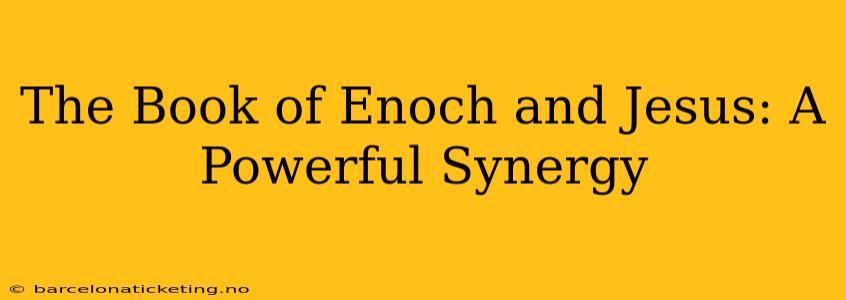The Book of Enoch, a non-canonical text excluded from the Bible's official canon, holds a fascinating position in religious studies. While not considered scripture by mainstream Christianity, Judaism, or Islam, its influence on early Christian thought and its potential parallels with the life and teachings of Jesus warrant a closer examination. This exploration delves into the significant thematic connections between the Book of Enoch and the figure of Jesus, highlighting their powerful synergy and the enduring legacy of this ancient text.
What is the Book of Enoch?
The Book of Enoch is an ancient Jewish apocalyptic text, attributed to Enoch, the great-grandfather of Noah. It's not a single unified work but rather a collection of diverse writings, likely composed over several centuries. Its contents include visionary accounts of Enoch's ascent to heaven, descriptions of celestial realms and angelic hierarchies, prophecies of future events, and warnings about divine judgment. The book's diverse literary styles and theological themes make it a complex and rich source for understanding early Jewish religious thought. The most notable sections include the Watchers, who are fallen angels, and the subsequent flood narrative.
The Watchers and the Fall: Parallels with Sin and Redemption
One of the most striking parallels between the Book of Enoch and the Christian narrative centers around the concept of the fall and the subsequent need for redemption. The Watchers, angelic beings who disobeyed God and engaged in forbidden acts with human women, represent a rebellion against divine order. Their actions, resulting in the corruption of humanity, echo the biblical account of the Fall of Man in Genesis. This mirrors the Christian understanding of sin's pervasive influence on humanity, setting the stage for the need for a savior. Jesus, in this context, can be seen as the ultimate redeemer, overcoming the consequences of the fall, both that of the Watchers and of Adam and Eve.
What are the main themes in the Book of Enoch?
The Book of Enoch explores several central themes, including:
- Angelic Hierarchy and Rebellion: Detailed descriptions of celestial beings and their roles, along with the narrative of the Watchers' rebellion, provide insights into early Jewish cosmology and angelology. This resonates with Christian ideas about the spiritual world and the battle between good and evil.
- Divine Judgment and the Coming Messiah: The book contains apocalyptic visions of future events, including a day of judgment and the arrival of a messianic figure. These prophecies resonate with similar themes in the Christian scriptures, highlighting the anticipation of a savior and a final reckoning.
- The Importance of Righteousness: Enoch's life is presented as an example of piety and righteousness. His unwavering commitment to God serves as a model for righteous living, mirroring the emphasis on ethical conduct found in the teachings of Jesus.
Jesus's Ministry and Enoch's Visions: Echoes of Prophecy
The apocalyptic visions found in the Book of Enoch anticipate many themes present in the New Testament accounts of Jesus' ministry. The prophecies of judgment, the coming of a righteous king, and the establishment of a new, just world find echoes in the teachings and actions of Jesus. While not direct prophecies of Jesus, the themes of redemption, divine intervention, and the ultimate triumph of good over evil are powerfully resonant in both texts.
How did the Book of Enoch influence early Christianity?
The Book of Enoch exerted a significant influence on early Christian thought. Several passages in the New Testament seem to allude to or reflect themes found in the Book of Enoch, suggesting that early Christians were familiar with and engaged with its contents. Furthermore, the book's depiction of angelic beings and celestial realms shaped early Christian angelology and cosmology. The influence is noticeable in the writings of some early Church Fathers.
The Son of Man: A Shared Figure?
The figure of the "Son of Man," a prominent character in the Book of Enoch, presents a particularly compelling point of comparison. This figure is often depicted as a divine judge who will preside over the final judgment, an image that resonates strongly with various New Testament depictions of Jesus. While the identity and precise role of the Son of Man in Enoch are debated, the parallel with Jesus's self-designation as the Son of Man in the Gospels is undeniable and has fueled much scholarly discussion.
Is the Book of Enoch considered scripture?
No, the Book of Enoch is not considered canonical scripture by mainstream Christian, Jewish, or Islamic traditions. Its exclusion from the biblical canon is a complex historical issue, related to debates over authoritative texts and theological interpretations. However, its historical and theological significance remains undeniable, particularly its influence on early Christian thought.
Conclusion: A Legacy of Influence
The Book of Enoch, though not a part of the accepted biblical canon, offers a fascinating lens through which to view the life and teachings of Jesus. The striking thematic parallels, the shared emphasis on divine judgment and redemption, and the intriguing figure of the Son of Man highlight a powerful synergy between this ancient text and the central figure of Christianity. While not a direct blueprint for the Christian faith, the Book of Enoch provides a rich backdrop that illuminates the historical and theological context within which Christianity emerged, offering valuable insights into the development of early Christian beliefs and understanding. Its continuing study provides a deeper appreciation for the rich tapestry of religious thought that shaped the religious landscape of the ancient world and continues to influence religious discussions today.

